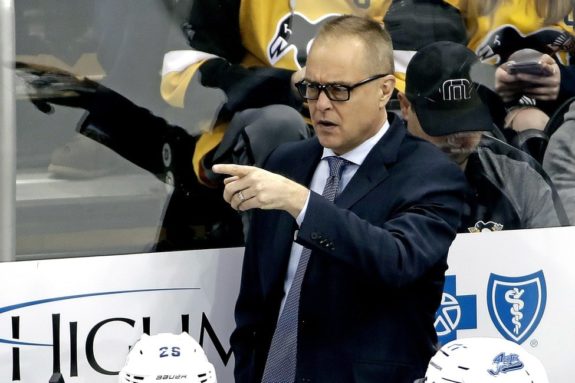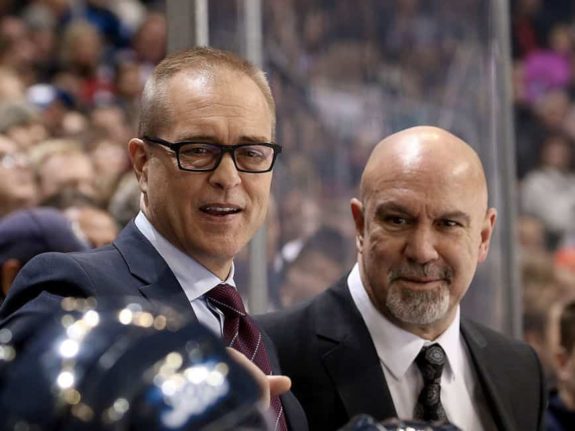Ask any Winnipeg Jets fan and they will tell you that a team is only as good as their coach. The moment Paul Maurice stepped up to fill Claude Noel’s position, there was an immediate and noticeable change. Not only had the Jets climbed out of last place in the Central Division, they also gained new opportunities for the playoffs. The reason for his success with the Jets? His vast amount of experience in the hockey world.

Maurice began his coaching career in 1995 after his short but prosperous defensive career with the Windsor Spitfires in the Ontario Hockey League (OHL) ended due to an eye injury. As a result of his talent and burning passion for the game, coaching opportunities outside of the OHL arose. Peter Karmanos saw his potential and offered Maurice an assistant coach position with the new OHL expansion team: the Detroit Jr. Red Wings. He proved himself to be a perfect fit as he led the Jr. Red Wings to an advantageous spot in the league. His hard work was rewarded when he was promoted to his first head coach position. With their new fearless leader, the Jr. Red Wings fought their way into a first-round playoff spot.
Developing an Expansive Repertoire
The NHL was in short sight for Maurice when the Hartford Whalers were purchased by Karmanos. Maurice was tasked with the challenge of bringing this new team to success, and he achieved more than anyone had imagined. At the ripe age of 28, he was officially the second-youngest NHL coach in history. Soon after his success, the franchise was moved to Raleigh, North Carolina, and the Whalers were renamed the Carolina Hurricanes. The Hurricanes ended their first season in last place, but with hard work and a dedicated coach, they were able to place first in their division the following year.
With the triumph of the Hurricanes under his belt, Maurice was hired by the Toronto Maple Leafs in 2005 to coach their affiliate American Hockey League (AHL) team, the Toronto Marlies. With his leadership, the Marlies flourished. The Maple Leafs strategically brought him up to coach for them, but unfortunately had to let him go in 2008 after a rough start to the season.
He returned to the Hurricanes for a bit, only to end up being let go for a second time due to a poor season. His passion never left him, so he packed up his family and moved to Russia to coach in yet another league — the Kontinental Hockey League (KHL). Ultimately, he decided he wanted to be closer to home, so he signed on with the Jets, where he is today.

Under Maurice, the Jets were off to considerable success, winning six out of their next eight games. “The players worked hard here,” he pointed out of the Winnipeg team. “If I thought I was going to have to come in here and pull teeth, it would have been too big a job… I really like the group of men that we have here, because they want to work.”
Changing His Game
His numerous coaching successes came with a never-ending number of challenges, both personally and professionally. “I lost my eyesight when I was 17 and you don’t realize how smart your dad is until 30 years later,” Maurice said. “I knew my [playing] career was over, but [dad] said that if you don’t learn how to change, you’re not going to survive. You have to learn how to change. That’s pretty much the way that I’ve coached. You’re looking for something new, without losing your principles. You’ve got to stay on the next movement. I enjoy that part, of what’s next.” (from ‘Jets Notebook: Road to 700 wins littered with thievery, Maurice reveals,’ Winnipeg Sun, 10/19/2019)
“I would say that I have changed as much as the game has.”
Paul Maurice.
The main challenge Maurice has faced is coming into new teams with new players and playing styles and having to work with them as individuals. The seasoned veteran has over 1,500 career games under his belt, and has coached five teams in four different leagues. With all the different players he has come to know and mentor, he had to find a way to positively get through to his players. It was during his stint in the KHL that he learned a whole new way to approach the younger generation.
Positivity-Forward Thinking
While having a heart-to-heart with one of his young KHL forwards, Maurice learned that what the players want is more affirmation on the good, rather than just focusing on the bad. He has been known for his infamous temper, as well as calling out individual players on their mistakes. “It really made me think: I have never spoken enough to the players, right? Reached out for the good things, make sure they know. [I didn’t] throw around a lot of compliments, so I do that way more… I try to acknowledge those guys.” (from ‘Now 51, Sault’s Paul Maurice has coached 31 years,’ Sault This Week, 05/21/2018)

The Stern Coach archetype was left behind, and through the years Maurice evolved to where players can now relate to him on a personal and professional level. Being able to relate to the coach allows a more open and honest dialogue, promoting a better sense of self on the ice and on the team. “I can understand the whole spectrum a player goes through. I can understand what it’s like to be a rookie in the NHL. I can understand what it’s like to be a dad and raising kids while you’re in the NHL. I can understand what it’s like to be 35. I’ve been through it all with players,” he reflected on his hockey career. A coach who is able to understand brings inexplicable confidence, especially to a young player.
This unique interpersonal way of approaching their game play is something Blake Wheeler had to recently remind Maurice of when he addressed an unidentified young player about his mistakes. “[Wheeler] grabs me a year and a half ago and says, ‘Just be nice to the guy’, and I got a list of about 14 reasons why I shouldn’t be… But that stuck with me.” It is easier to focus on the negatives and shout when someone makes a mistake than it is to bring understanding. When a young player feels appreciated and respected, they are more likely to work harder — and he knows this.
The Jets’ coach has always been ahead of his time by understanding where his players are coming from, promoting open dialogue, as well as taking risks on young, inexperienced players. Maurice’s influence on the Jets will never be forgotten by players and fans alike, and he will always be the one revered with Winnipeg’s return to hockey glory.